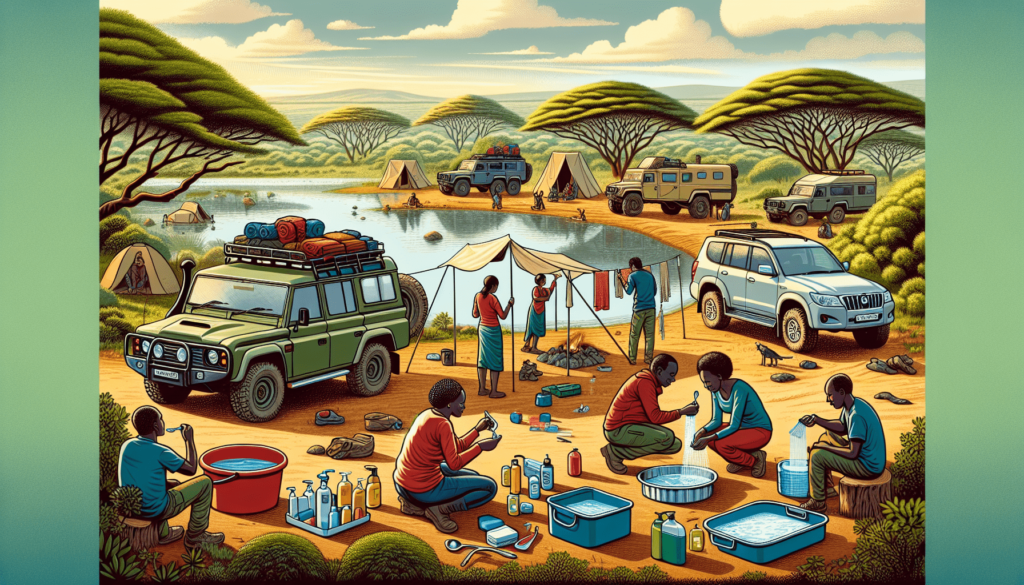So you’ve decided to embark on an adventure-filled overlanding journey, a thrilling escapade that will take you off the beaten path and allow you to explore the beauty of the great outdoors. But amidst the exhilaration and picturesque landscapes, you might find yourself wondering, “How do I maintain personal hygiene while overlanding?” Fear not, dear explorer, for in this article, we will guide you through some essential tips and tricks to ensure you stay fresh and clean during your rugged expedition.
Water Supply and Storage
Carrying Sufficient Water
When you embark on an overlanding adventure, one of the most crucial aspects of maintaining personal hygiene is ensuring you have an ample supply of clean water. It is essential to bring enough water for drinking, cooking, cleaning, and personal hygiene purposes. Plan your water needs based on the duration of your trip and the number of people in your group. Remember that it’s always better to have a little extra water than running out in the middle of nowhere.
Using Water Filters
While carrying enough water is vital, sometimes you may find yourself in a situation where your supply runs low. In these cases, having a water filter can be a lifesaver. Water filters can effectively remove impurities and contaminants from natural water sources, such as rivers or lakes, making the water safe for drinking and personal hygiene. Invest in a high-quality water filter that is portable and easy to use, ensuring that you always have access to clean water, even when your supply is limited.
Water Storage Containers
To ensure the availability of clean water throughout your overlanding journey, consider investing in suitable water storage containers. Look for containers that are BPA-free and have a sturdy construction to avoid leaks or breakage. Opt for containers that have a large capacity but are also stackable to maximize storage space in your vehicle. Don’t forget to sanitize the containers regularly to prevent the growth of bacteria or algae.
Portable Shower Options
Solar-powered Portable Showers
Maintaining personal hygiene includes staying clean and fresh, even when you’re out in the wilderness. Solar-powered portable showers are an excellent option for overlanders as they provide you with the luxury of a hot shower without the need for electricity. These showers use the sun’s energy to heat the water stored in the shower bag, allowing you to enjoy a warm and refreshing shower wherever you go. Additionally, they are lightweight, compact, and easy to set up, making them perfect for overlanding adventures.
Pressurized Portable Showers
If you prefer a more traditional shower experience, you might want to consider investing in a pressurized portable shower. These showers work by pressurizing water using air pressure or a pump, allowing you to enjoy a steady stream of water for a more comfortable showering experience. Pressurized portable showers often come with adjustable nozzles, ensuring you can customize the water flow to meet your preferences. With their compact and lightweight design, these showers can be easily packed and used anywhere during your overlanding journey.
Bucket Showers
If you’re looking for a budget-friendly personal hygiene solution, a bucket shower might be just what you need. A bucket shower involves filling a large container, such as a bucket or collapsible water container, with water and using a smaller container or cup to pour the water over yourself for washing. While it may not provide the same level of convenience as a portable shower, a bucket shower is a practical option for remote locations where water supply is limited. It’s a simple and effective way to stay clean and fresh on the road.

Camping Toilets and Waste Disposal
Choosing a Portable Camping Toilet
Proper waste disposal is an essential aspect of maintaining personal hygiene while overlanding. When nature calls, it’s crucial to have a portable camping toilet on hand. When choosing a camping toilet, consider factors such as size, weight, and ease of use. Look for toilets that are easy to clean and have a sturdy and stable design. Some camping toilets even come with built-in waste disposal systems, ensuring sanitary conditions and minimizing odors. Don’t forget to pack extra toilet waste bags or disposable liners for easy and hygienic waste disposal.
Proper Waste Disposal
Proper waste disposal is not only important for personal hygiene but also for preserving the environment. When disposing of waste while overlanding, always follow the principle of “Leave No Trace.” This means packing out all solid waste, including toilet paper, and disposing of it properly in designated waste bins or facilities. Never bury or leave waste behind, as it can harm the environment and wildlife. Be responsible and respectful of the areas you visit, ensuring that you leave them as clean as when you arrived.
Biodegradable Toilet Paper
When it comes to toilet paper, choose biodegradable options that are environmentally friendly. Biodegradable toilet paper breaks down more easily and quickly, reducing its impact on the environment. Look for toilet paper that is specifically labeled as biodegradable and safe for use in nature. By opting for biodegradable toilet paper, you can minimize your ecological footprint and contribute to preserving the natural beauty of the areas you visit during your overlanding adventures.
Personal Hygiene Products
Biodegradable Soaps and Shampoos
Maintaining personal hygiene while overlanding doesn’t mean compromising on environmental responsibility. Opt for biodegradable soaps and shampoos that are specifically formulated to minimize their impact on the environment. These products are designed to break down quickly and naturally, reducing pollution in water sources. Look for eco-friendly options that are free from harmful chemicals while still providing effective cleaning and hygiene. By choosing biodegradable personal care products, you can keep yourself clean without harming the environment.
Toothbrush and Toothpaste
Proper oral hygiene is essential, regardless of where you are. Make sure to pack a toothbrush and toothpaste that are suitable for travel. Look for compact and lightweight options that won’t take up too much space in your toiletry bag. Consider using travel-sized toothpaste tubes or solid toothpaste tablets to minimize waste and save space. Don’t forget to brush your teeth at least twice a day, even when you’re on the road, to maintain optimal oral health.
Hand Sanitizer
Especially during times when access to water and soap may be limited, having a reliable hand sanitizer is crucial for maintaining personal hygiene. Choose a hand sanitizer that contains at least 60% alcohol, as recommended by the Centers for Disease Control and Prevention (CDC). Keep a bottle of hand sanitizer readily available in your vehicle or backpack, so you can sanitize your hands before and after any activities that may involve touching surfaces or interacting with others.

Laundry Solutions
Hand-washing Clothes
Keeping your clothes fresh and clean during your overlanding trip may seem challenging, but it can be easily achieved with some simple hand-washing techniques. Pack a small container filled with biodegradable laundry detergent and a lightweight clothesline, so you can easily wash and dry your clothes wherever you go. Find a suitable water source, such as a river or basin, and use your biodegradable detergent to hand wash your clothes. Hang them on the clothesline and let them dry naturally in the fresh air.
Portable Washing Machines
If you’re looking for a more convenient way to do laundry while overlanding, portable washing machines are a great option. These compact and lightweight machines allow you to wash your clothes with ease, using minimal water and electricity. Simply load your clothes, add water and detergent, and let the machine do the work for you. Portable washing machines are designed to be energy-efficient and require less water compared to traditional washing machines, making them perfect for overlanding adventures.
Choosing Quick-dry Fabrics
To make laundry management easier during your overlanding journey, consider choosing clothes made from quick-dry fabrics. These fabrics are specially designed to dry quickly, minimizing the time and effort required for laundry. Look for clothing items made from materials such as polyester or nylon, as they tend to dry faster than natural fibers like cotton. Quick-dry clothes are not only convenient for washing and drying on the road but also for staying comfortable as they wick away moisture from your body.
Managing Trash and Litter
Bringing Trash Bags
Proper waste management is essential to maintaining personal hygiene and preserving the environment during your overlanding adventures. Always carry an adequate supply of trash bags to contain your waste and litter. Separate your trash into different bags, such as one for general waste and another for recyclables. Make sure to securely tie and store the trash bags to prevent odors, leaks, or littering while on the road. Dispose of your trash responsibly in designated waste bins or facilities whenever available.
Separating Recyclables
Minimizing your environmental impact while on the road involves separating your recyclables from general waste. Some places may have recycling facilities available, while others may require you to carry your recyclables with you until you reach a suitable disposal point. Consider bringing separate containers or bags for recyclables and educating yourself on the local recycling guidelines. By separating and properly disposing of recyclables, you contribute to reducing waste and protecting the environment throughout your overlanding journey.
Leave No Trace Principles
When exploring the outdoors and enjoying nature, it is essential to follow the principles of “Leave No Trace.” These principles serve as guidelines to minimize your impact on the environment. Always respect wildlife and ecosystems, and leave natural and cultural features as you found them. Avoid damaging vegetation, disturbing habitats, or leaving any type of trace, including litter or graffiti. By adhering to these principles, you can help maintain the beauty and integrity of the natural areas you visit.
Personal Grooming
Trimming and Maintaining Facial Hair
Overlanding adventures often involve spending extended periods away from civilization. This makes it important to consider personal grooming, including the maintenance of facial hair. Bring along a compact, portable trimmer or grooming kit to keep your facial hair well-groomed. Regularly trimming and maintaining your beard or mustache will not only contribute to personal hygiene but also help you feel more comfortable during your journey.
Keeping Nails Clean
Maintaining overall personal hygiene involves paying attention to the cleanliness of your nails. Keep a nail clipper or small manicure set in your toiletry bag to regularly trim your nails. Dirt and bacteria can easily accumulate under long nails, so it’s important to keep them tidy to avoid infections and maintain good personal hygiene. Additionally, consider packing a small brush or toothpick to clean underneath your nails regularly.
Maintaining Overall Appearance
While overlanding may involve a rugged lifestyle, it doesn’t mean you can’t pay attention to your overall appearance. Make sure to wash your face daily to remove dirt, oil, and sweat that can accumulate from outdoor activities. Use a moisturizer and lip balm to keep your skin hydrated, especially in dry or harsh weather conditions. Remember to comb or brush your hair regularly and consider tying long hair back to prevent it from becoming tangled or dirty during outdoor activities. Taking these small steps will help you feel fresh and clean, boosting your overall well-being during your overlanding adventure.
Staying Clean in the Outdoors
Choosing Appropriate Clothing
When it comes to personal hygiene while overlanding, choosing the right clothing is crucial. Opt for moisture-wicking and breathable fabrics that will keep you comfortable and help regulate body temperature. Layer your clothing to easily adapt to changing weather conditions and avoid overheating or getting too cold. Additionally, consider wearing long-sleeved shirts and pants to protect your skin from sunburn, insect bites, or scratches from vegetation.
Using Wet Wipes
While access to showers and running water may be limited during your overlanding journey, wet wipes can come to the rescue. Pack a supply of unscented or biodegradable wet wipes in your gear, as they provide a quick and convenient way to freshen up in between proper showers. Use them to wipe down your body, face, and hands, helping you stay clean and refreshed when traditional bathing is not possible.
Regular Cleaning of Cooking Equipment
Maintaining personal hygiene also extends to the cleanliness of your cooking equipment. After every meal, take the time to clean your pots, pans, and utensils thoroughly. Use biodegradable soap or detergent, warm water, and a scrub brush to remove any food residue or grease. Properly clean and dry your cooking equipment before storing them to prevent bacteria or mold growth. Regularly maintaining clean cooking equipment contributes to a healthy and hygienic cooking environment throughout your overlanding journey.
Staying Fresh on the Road
Frequent Changing of Clothes
Although it may be tempting to wear the same clothes for multiple days on an overlanding adventure, frequent changing of clothes is essential for maintaining personal hygiene. Regularly changing into fresh clothes helps prevent the buildup of bacteria, sweat, and odor. Pack enough clothing for the duration of your trip and consider lightweight, versatile items that are easy to wash and dry.
Packing Fresh Towels
While staying clean and fresh, don’t forget about the importance of using clean towels. Pack several lightweight and quick-drying towels to have readily available for showering, drying off, or even as makeshift picnic blankets. Choosing fresh towels that are regularly cleaned will help ensure optimal personal hygiene and enhance your overall comfort during your overlanding journey.
Using Air Fresheners
Maintaining a pleasant environment in your vehicle is also important for personal hygiene. Consider using air fresheners or natural alternatives, such as essential oil diffusers, to combat any unwanted smells that may develop during your overlanding adventure. Opt for scents that are refreshing and uplifting, such as citrus or lavender, to enhance your overall well-being and create a pleasant atmosphere in your vehicle.
Personal Protection
Using Sunscreen
Protecting your skin from the harmful effects of the sun is vital during your overlanding journey. Apply sunscreen with a high sun protection factor (SPF) before heading outdoors, and reapply it regularly, especially if you’re exposed to the sun for extended periods. Choose a broad-spectrum sunscreen that protects against both UVA and UVB rays. Pay attention to areas that are easily forgotten, such as the ears, back of the neck, and top of the feet. By using sunscreen, you can prevent sunburn, premature aging, and the risk of skin cancer.
Applying Bug Repellent
While enjoying the great outdoors, it’s essential to protect yourself from pesky bugs and insects. Apply insect repellent to exposed skin to minimize the risk of mosquito bites, ticks, or other biting insects. Look for repellents that contain active ingredients like DEET or Picaridin, as they have been proven effective against various insects. Remember to follow the instructions on the product and reapply as necessary to maintain protection.
Protective Clothing and Gear
In addition to using sunscreen and bug repellent, wearing appropriate protective clothing and gear can further enhance personal hygiene and minimize exposure to environmental elements. Consider wearing hats, sunglasses, and long-sleeved shirts or lightweight jackets to protect yourself from the sun’s rays and potential insect bites. If you’re engaging in activities such as hiking, biking, or off-roading, wear protective gear such as helmets, kneepads, or gloves for added safety and hygiene.
By following these comprehensive guidelines, you can maintain excellent personal hygiene while on your overlanding adventure. From ensuring a clean water supply and utilizing portable showers to practicing proper waste disposal and using personal grooming products, you’ll be equipped to stay fresh and clean throughout your journey. Remember, personal hygiene is not only essential for your well-being but also for preserving the environment and leaving nature’s beauty intact. Enjoy your overlanding experience while keeping both yourself and the great outdoors in optimal condition. Happy travels!

